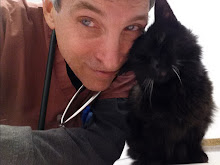When I was a small boy, our family flew from our Great Lakes home to visit my father’s family in California. It was there that, at the age of seven, I met my 35-year-old Uncle Chuck – the most wonderful guy in the world.
He laughed at the things I found funny, talked in a way I could totally relate to, and seemed interested in doing everything a seven-year-old liked to do. He was also brave; as a diabetic, he thought nothing of sticking himself with needles and even smiled when he did it. I was in awe of him. When it was time to leave two weeks later, I kissed my Grandparents goodbye (it would be the last time I ever saw my Grandpa George). But it was my Uncle Chuck that I would really miss.
The next time I saw him was when I was 13. Relatives from all over the country came to town for my Bar Mitzvah, and while we could not house everyone, Chucky and my grandmother stayed with us. I was thrilled with the idea of seeing my fun uncle once again.
But things were different. Chucky seemed a bit too childish – too “seven” – for me to relate to as I had just six years earlier. It was the first inkling I had that something wasn't quite right with him. Despite the mantle of adulthood my reformed Jewish synagogue was about to confer upon me, I was still a kid. But I felt more mature than Chucky, who seemed to have never left play age.
As the big day was coming, our house was full of packed items that would go to the temple. Despite the obstacle course of boxes in the kitchen, I was convinced I could lithely wend through it until, while running, I inadvertently hooked my toe into a stack of catering dishes and brought the porcelain tower down, smashing most of them. My mother screamed at me. My grandmother scolded me. But when Chuck parroted them - when he got right in my face and joined the enraged cacophony - it was a startling moment for me. I suddenly did not know this screaming man. And I ran upstairs, crying.
About an hour later, when the flames of those tempers died down to quiet embers disappointment, my mother entered my room and sat down beside me. I was still in tears over how Uncle Chuck – who was my buddy, my friend – could so abruptly channel the anger around him and direct it to me in such a concentrated spit of venom. My mom took a breath, then gently spoke to me in careful words about this sudden stranger named Chuck.
In addition to diabetes, my uncle was born with a heart defect that compromised oxygen delivery to his brain. The problem was soon repaired, but it had taken a terrible toll on his mental development. In the vernacular of the day, he was considered mentally retarded. Today we might perhaps more palatably say he was cognitively challenged. But in truth he was never challenged at all. He lived quite comfortably in his world with no expectations or pressures to grow beyond it.
When those dishes came crashing down, a piece of my childhood naivety was shattered. Suddenly, I saw the tragic scaffold beneath the veneer of this fun and happy man. The perpetuity of his seven-year-old juvenescence was a constant against which the measure of my maturity suddenly became clear. And when I stood in front of the ark two days later, ostensibly to become a man under Judaic tenets, my real journey had already begun. And as I stepped into adulthood, my Uncle Chuck had to stay behind, forever locked in a world of toys and coloring books.
I was 22 when he died from complications of his heart disease and diabetes. I went to the funeral, but I had already been saying my goodbyes to him gradually over the years. He quietly slipped away with my childhood, then he slipped away forever. Yet a part of him remains in my heart. I can still travel back to being seven. And when I do, there he is, smiling, in the toy chest of simple and magical memories.
Subscribe to:
Post Comments (Atom)








No comments:
Post a Comment